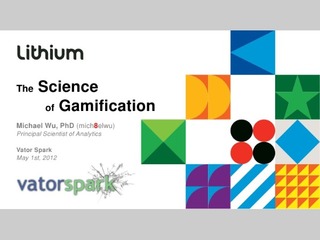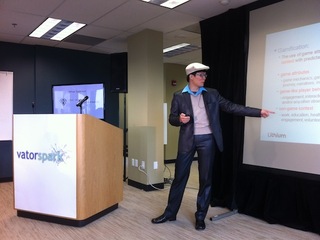
Video: Michael Wu on the science of gamification
Chief Scientist of Lithium on motivation, trigger and gamification
Vator brought together thought leaders in gamification with various VCs and entrepreneurs to share insights on how gamification can benefit any business when thoughtfully executed.
The first keynote speaker at our inaugural Vator Spark event was Michael Wu, chief scientist, from Lithium.com. Wu says that gamification is a psychologically driven science. There are three factors that are behind all human behavior: Motivation (a want to do something), ability (when you can, in fact, do something) and trigger (when you are told to do something). Gamification is the convergence of all three of these factors.
For a great write-up, see Krystal Peak's "Gamification is not alone a sustainable solution."

Kristin Karaoglu
Woman of many skills: Database System Engineer; SplashX event producer; Author of Startup Teams
All author postsRelated Companies, Investors, and Entrepreneurs
Lithium Technologies
Startup/Business
Joined Vator on
Your customers are everywhere. Lithium helps you find your social customers, understand their influence, and build lasting relationships. For market leaders such as Best Buy, AT&T, Research In Motion Limited (RIM), Univision, and PayPal, Lithium is the leading provider of social customer solutions that deliver real business results. The Lithium Social Customer Suite offers complete social monitoring, a comprehensive community platform, and actionable analytics across millions of blogs, forums, and social networking sites. Our technology is proven in high-volume, growth environments and provides security, open and custom APIs, and multi-language support. Founded in 2001, Lithium is privately held with headquarters in Emeryville, California. For more information, visit www.lithium.com. Or, engage with us on Twitter, Facebook, and our community – the Lithosphere.

Michael Wu PhD
Joined Vator on
I'm the Principal Scientist at Lithium. My research includes: behavioral economics of gamification, modeling Influence propagation, predictive and actionable social analytic, cyber anthropology, etc.Related News

